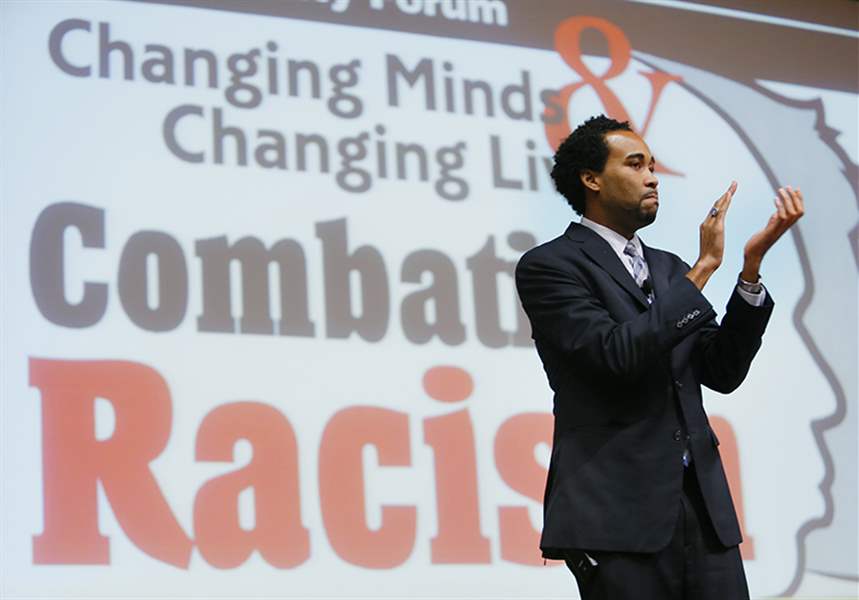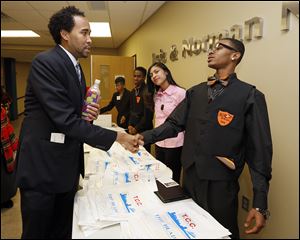
Changing Minds, Changing Lives
Forum seeks to lift blacks’ education right from start
Toledo urged to stand up for excellence
1/10/2014
David Johns, executive director of the White House Initiative on Educational Excellence for African-Americans, said black youths need early encouragement.
THE BLADE/ANDY MORRISON
Buy This Image

David Johns, executive director of the White House Initiative on Educational Excellence for African-Americans, said black youths need early encouragement.
David Johns told the dozens of members of Young Men and Women of Excellence to stand up and be acknowledged. Too often, he said later, we don't talk about black men and women and excellence. When we do, it's framed as an exception.
“When people talk about African-American kids and education, it's negative,” said Mr. Johns, executive director of the White House Initiative on Educational Excellence for African-Americans. “It's what they are not doing; it's what they are not capable of doing.”
It's time to change that narrative, Mr. Johns said, and have real conversations about education and race that may make us uncomfortable, but are necessary.
PHOTO GALLERY: Click here to view photos from the forum.
Several hundred people braved the elements and filled the University of Toledo's Nitschke Auditorium on Thursday for the second Changing Minds, Changing Lives forum. Mr. Johns served as keynote speaker for the forum, sponsored by the Toledo Community Coalition and The Blade.
Mr. Johns said that as a child, teachers criticized him for expressing professional aspirations instead of picking up a trade. A guidance counselor told him he didn't appreciate the quantity and quality of colleges to which he applied.
Not enough African-American children are told they can and should go to college. We don't celebrate the high-achieving students. Instead, he said, we celebrate kids who can play basketball or football.
The White House initiative focuses on improving access to high-quality education for African-American students in an attempt to reduce the achievement gap with white students. Mr. Johns didn't just talk about the problems of inequality, he gave a list of ways to help close the gaps.
Not enough black youths, especially boys, have adults affirming them early in life, he said. Communities should recruit mentors, he said.

David Johns, left, leader of the White House Initiative on Educational Excellence for African-Americans, speaks with Sierra Stelter, a Woodward High School junior, and Day’Shawn Jones, a Woodward senior.
African-American youths are much more likely to go to low-quality, early-childhood education centers than students of other races, Mr. Johns said. Improving the quality of early-childhood education, especially in black communities, is practical, and would make a major difference, he said.
Mr. Johns, 31, obtained a master’s degree in sociology and education policy at Teachers College, Columbia University, where he graduated summa cum laude while simultaneously teaching elementary school in New York City. He graduated with honors for his bachelor’s degree from Columbia University in 2004 with a triple major in English, creative writing, and African-American studies.
He was appointed by President Obama to his current position after serving as senior education policy adviser for the U.S. Senate Committee on Health, Education, Labor, and Pensions.
He also was on the staff of the late Sen. Ted Kennedy (D., Mass.) and is a former Congressional Black Caucus Foundation Fellow.
His research as an Andrew W. Mellon Fellow served as a catalyst to identify, disrupt, and supplant negative perceptions of black males, both within academia and society.
Mr. Johns has worked on issues affecting low-income and minority students, neglected youths, and early childhood education, and with historically black colleges and universities.
Mayor D. Michael Collins helped introduce Mr. Johns, and said the people in the room needed to be missionaries for a better city.
“We have the responsibility to leave this world at the end of our journey in a better place than we've found it,” Mr. Collins said.
After Mr. Johns spoke, there was a question-and-answer session with a panel that included Dr. Lloyd Jacobs, University of Toledo president; Toledo Public Schools Superintendent Romules Durant; Jonathan Locust, Ashland University’s director of institutional diversity; Dale Snauwaert, a professor of educational theory and social foundations of education at UT; Hope Bland, a TPS social worker; Susan Brown, chairman of the Bowling Green State University sociology department, and UT student Christopher Scott.
While highlighting the successes of black students is important, panelists and Mr. Johns also discussed the difficulties they face. America has had a significant and persistent achievement gap for decades between minority and white students in academics.
“The fact that it exists is an injustice,” Mr. Snauwaert said.
Mr. Johns and panelists also discussed how there is a dearth of black teachers, especially men. Young African-American men often don't see examples of people who look like them who are successful.
And while the efforts of teachers who go above and beyond aren't recognized enough, there are also many teachers who don't connect with students on a personal level. Discipline rates for black children, especially boys, are much higher than for white students. Most of those suspensions, Mr. Johns said, were for nonviolent actions, and often times are for “disrespect,” which can be based in cultural misunderstandings.
Teachers need to meet students “where they are,” several panelists said.
“Kids don't care about how much you know until they know how much you care,” Christopher Scott said.
The forums were motivated by The Blade's publication of “Battle Lines: Gangs of Toledo,” a series that started in April and sparked conversations about gangs and race.
The first Changing Minds, Changing Lives forum was in September at Woodward High School and featured Tim Wise, who has studied white privilege and institutional racism. A forum tentatively set for March will look at generational poverty.
Organizers plan to hold additional forums in coming months.
Mr. Durant at one point led members of Young Women of Excellence and Young Men of Excellence through a rendition of their mottoes, such as “I am my brother's keeper.” The two organizations are peer-mentor and peer-leadership groups that Mr. Durant has led and helped grow in recent years.
Mr. Johns made them do it again, he said, so that he could record it and show it to President Obama.
After the session, members said they liked how Mr. Johns focused on the positive, on building people up, instead of on put-downs. And, expressing the confidence that Mr. Johns said they should have, they said they felt they should have been the ones on the stage giving their opinions, instead of the adults.
Day’Shawn Jones, 17, a senior at Woodward High School and president of its Young Men of Excellence chapter, said he often hears teachers and preachers and others talk about the problems within the city, and how they need to be fixed. And yet, he said, nothing seems to be done.
Lyric Carter, 17, the vice president of Woodward's Young Women of Excellence chapter, agreed. It's time for people to step up and to stop talking.
“Stop waiting for it to happen,” she said. “Make it happen.”
Contact Nolan Rosenkrans at: nrosenkrans@theblade.com or 419-724-6086, or on Twitter @NolanRosenkrans.